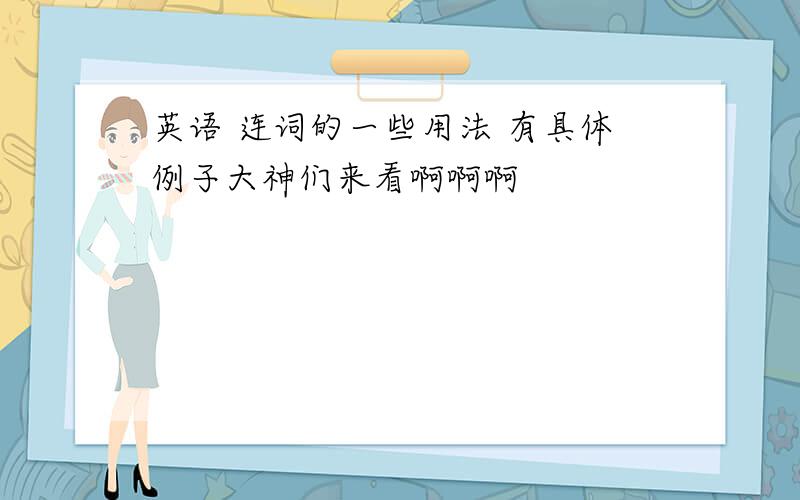英语 连词的一些用法 有具体例子大神们来看啊啊啊
来源:学生作业帮 编辑:神马作文网作业帮 分类:英语作业 时间:2024/11/17 09:03:17
英语 连词的一些用法 有具体例子大神们来看啊啊啊
从属连词的定义中强调连词两边都应该是完整的句子,且连词本身不做句子成分.
但是从最简单的宾语从句说起,tell me who gave you this.这里的who很明显做了从句的主语啊.
类似的有they looked across to see where the noise was coming from.这句话where做了宾语.这是怎么回事?
从属连词的定义中强调连词两边都应该是完整的句子,且连词本身不做句子成分.
但是从最简单的宾语从句说起,tell me who gave you this.这里的who很明显做了从句的主语啊.
类似的有they looked across to see where the noise was coming from.这句话where做了宾语.这是怎么回事?

从属连词的定义中强调连词两边都应该是完整的句子,且连词本身不做句子成分.
但是从最简单的宾语从句说起,tell me who gave you this.这里的who很明显做了从句的主语啊.
类似的有they looked across to see where the noise was coming from.这句话where做了宾语.这是怎么回事?
【三】宾语从句:宾语从句在主从复合句中起宾语的作用,是一种名词性从句,既可作谓语动词的宾语,也可作介词、非谓语动词(动词不定式、动名词、分词.形容词)的宾语根据引导宾语从句的不同连词,宾语从句可分为三类.
1.由that引导的宾语从句.that只有语法作用,没有实在的意义,在口语
和非正式文体中可以省略.例如:
He said (that) he wanted to stay athome.
She doesn’t know (that) she isseriously ill.
I am sure (that) he will succeed.
2.由连接代词who,whom,whose,what,which和连接副词when,where,why,how引导的宾语从句.这些连接代词和连接副词在宾语从句中充当某个成分.例如:
Do you know who (whom) they are waitingfoe?
He asked whose handwriting was thebest.
Can you tell me where the No.3 bus stopis?
I don’t know why the train is late.
3.由if或whether引导的宾语从句.if和whether在句中的意思是“是否”.例如:
I want to know if (whether) he livesthere.
He asked me whether (if) I could helphim.
(二)宾语从句的语序
宾语从句的语序应为陈述句的语序.例如:
I hear (that) physics isn’t easy.
I think (that) you will like thisschool soon.
Can you tell me how I can get to zoo?
Please tell me when we’ll have themeeting.
(三)宾语从句的时态
1.如果主句的时态是一般现在时,宾语从句该用什麽时态就用什麽时态.
如:I don’t think (that) you are right.
Please tell us where he is.
Can you tell me how I can get to therailway station?
2.如果主句的时态是一般过去时,宾语从句只能用相应的过去时态(一般过去时,过去进行时,过去将来时,过去完成时).例如:
He asked what time it was.
He told me that he was preparing forthe sports meet.
He asked if you had written to Peter.
He said that he would go back to the U.S.soon.
3.如果宾语从句所陈述的是客观真理,其时态常用一般现在时.例如:
Our teacher said that January is thefirst month of the year.
Scientists have proved that the earthturns around the sun.
4.当主句谓语动词是think、believe、imagine等时,后面的宾语从句要表示否定意义时,要通过主句的否定式来实现,即否定主句中的动词.e.g.我认为他明天不会来.
(wrong)I think he willnot come tomorrow.
(right)I don’t think hewill come tomorrow.
某些形容词后面也可有宾语从句,这些形容词有:sure、certain、glad、pleased、happy、afraid、surprised、satisfied等.e.g.I’m sure you can learn English well.
但是从最简单的宾语从句说起,tell me who gave you this.这里的who很明显做了从句的主语啊.
类似的有they looked across to see where the noise was coming from.这句话where做了宾语.这是怎么回事?
【三】宾语从句:宾语从句在主从复合句中起宾语的作用,是一种名词性从句,既可作谓语动词的宾语,也可作介词、非谓语动词(动词不定式、动名词、分词.形容词)的宾语根据引导宾语从句的不同连词,宾语从句可分为三类.
1.由that引导的宾语从句.that只有语法作用,没有实在的意义,在口语
和非正式文体中可以省略.例如:
He said (that) he wanted to stay athome.
She doesn’t know (that) she isseriously ill.
I am sure (that) he will succeed.
2.由连接代词who,whom,whose,what,which和连接副词when,where,why,how引导的宾语从句.这些连接代词和连接副词在宾语从句中充当某个成分.例如:
Do you know who (whom) they are waitingfoe?
He asked whose handwriting was thebest.
Can you tell me where the No.3 bus stopis?
I don’t know why the train is late.
3.由if或whether引导的宾语从句.if和whether在句中的意思是“是否”.例如:
I want to know if (whether) he livesthere.
He asked me whether (if) I could helphim.
(二)宾语从句的语序
宾语从句的语序应为陈述句的语序.例如:
I hear (that) physics isn’t easy.
I think (that) you will like thisschool soon.
Can you tell me how I can get to zoo?
Please tell me when we’ll have themeeting.
(三)宾语从句的时态
1.如果主句的时态是一般现在时,宾语从句该用什麽时态就用什麽时态.
如:I don’t think (that) you are right.
Please tell us where he is.
Can you tell me how I can get to therailway station?
2.如果主句的时态是一般过去时,宾语从句只能用相应的过去时态(一般过去时,过去进行时,过去将来时,过去完成时).例如:
He asked what time it was.
He told me that he was preparing forthe sports meet.
He asked if you had written to Peter.
He said that he would go back to the U.S.soon.
3.如果宾语从句所陈述的是客观真理,其时态常用一般现在时.例如:
Our teacher said that January is thefirst month of the year.
Scientists have proved that the earthturns around the sun.
4.当主句谓语动词是think、believe、imagine等时,后面的宾语从句要表示否定意义时,要通过主句的否定式来实现,即否定主句中的动词.e.g.我认为他明天不会来.
(wrong)I think he willnot come tomorrow.
(right)I don’t think hewill come tomorrow.
某些形容词后面也可有宾语从句,这些形容词有:sure、certain、glad、pleased、happy、afraid、surprised、satisfied等.e.g.I’m sure you can learn English well.